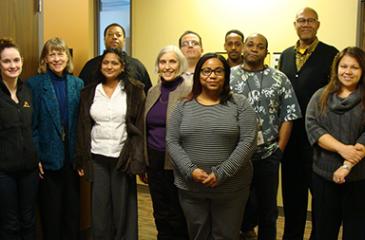Over the past several weeks, ten local organizations enhanced their capacity to develop research projects that address health issues facing their communities.
They attended Community Research Institute (CRI), a six-week workshop that trains community leaders and staff in health-related research methodology for developing and conducting grant-fundable research projects. CTSI collaborates on the annual event with two other University organizations, the Center for Health Equity and the Program in Health Disparities Research.
Real-world research skills
For example, Susen Fagrelius of the Little Earth of United Tribes is studying how diabetes and other chronic, food-related conditions impact the local Native American community, with the hopes of helping its members make positive choices about their health.
"The benefits of the Community Research Institute are beyond what I could ever imagine," said Fagrelius. "Getting study funding that could last several years used to be only a dream. Now, I know it's possible."
Participants (shown) learned how to apply the research skills they learned to a real-world project, and increase their capacity to develop grant-fundable research projects. In addition, they received expert feedback on their project proposals via one-on-one consultations with University faculty, developed a better understanding of the University research resources available to help them, and had the opportunity to network with researchers at the University and in the community.
The power of partnerships
Sue Everson-Rose, PhD, MPH, Associate Professor of Medicine and Associate Director of the Program in Health Disparities Research, stressed the importance of the relationship between the University and the broader community during the final session, telling participants, "We're trying to do community-based participatory research better, and we can't do that without community."
Fagrelius echoed this cooperative sentiment, noting, "It's so important to approach research collaboratively, and in a way that honors, respects, and protects the community."
This year's CRI participants represented a diverse group of participants, with representatives from Arubah Emotional Health Services, East Philips Park Sports Association, Junior League of St. Paul, Little Earth of United Tribes, Minneapolis Urban League, Native American Community Clinic, New American Alliance for Development, Open Cities Health Center, Rainbow Health Initiative, and SEWA-AIFW (Asian Indian Family Wellness).
